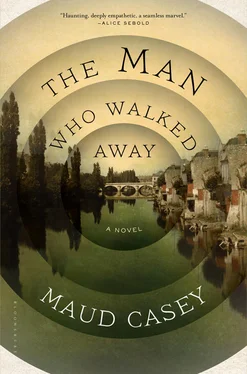“How are you this morning?” the Doctor asks.
She gives the Doctor the withering look to which he has grown accustomed, a look that says she can’t be bothered to explain something so complex to such a simple man. Claude nods to the Doctor. Claude’s face is pouched; his red-rimmed eyes red-rimmed since the day he began the job. He unpins Marian’s thick hair and tugs a fine-toothed comb through it until she closes her eyes, tilts her head back. He smiles at the Doctor, who, watching the miracle of Claude’s posture — an enormous round man, he has elegant posture — is grateful that he is helping. He seems to be finding comfort even as he is giving it. The Doctor knows a conversation with Marian can feel like a loose sock slipping down his leg after he has just finished pulling it back up. But this analogy is not even his own but something Elizabeth shouts when she cannot finish whatever puzzle she is currently working on: My stockings are falling down again!
“There’s someone new,” Claude says. “It’s upset the balance.”
“I’ll be back,” the Doctor says to Marian, nodding to Claude.
“Always vigilant,” she says, eyes still closed.
“You’re back,” says the Director when the Doctor walks into the common room. The Director wields a rake as though it were a rifle, gathering everyone for a walk. “Come, everyone, up, up. Time to take some air.”
The usual crowd is assembled. Walter plays chess with himself, sharing the table with Elizabeth and the half-finished jigsaw puzzle of the funicular railroad in Lyon that has been distracting her from the divine miracle of the scratch on her cheek long enough that Claude’s son Henri was able to trim her fingernails this morning. At the piano, Rachel plays the last movement of Schumann’s Kresleriana; her frog is in a playful, menacing mood.
Gliding down the long hall that runs along the living room and the men’s bedrooms to the billiard room is Nurse Anne. The Doctor has never seen her standing still. Her walk is so swift and efficient that Claude and Henri have started a rumor among the other attendants that her feet don’t actually touch the ground. As she floats in his direction, the Doctor thinks, as he often does, She could be my sister. Her features, like the Doctor’s, are crowded on her small face; her brown-flecked green eyes a little close together as though she is always in the midst of solving a problem elsewhere even as she is in the midst of the one in front of her, which is usually true. When he first met her, he thought, She could be my sister , and then, She would have been my unfortunate sister . But the truth was she never would have been his sister, unfortunate or not. She arrived here from an entirely different world — educated at home in London by an eccentric wealthy father. (Had she said something once about a pet owl, or was the Doctor confusing her with a character in a novel he read recently?) Her father hadn’t believed governesses were up to the task, so he took her around the world in order to cultivate her natural intelligence, but when she said she wanted to become a nurse and wear plain woolen dresses instead of marrying the flatulent cousin her father had chosen for her, he exploded. “There will be no slumming it in almshouses and penitentiaries. No cholera graveyard for you!” So she married the flatulent cousin until, as she explained to the Doctor, “I was up to my chin in linen and glass,” and she left. In this, she and the Doctor were related; she, too, had walked out of a life. She also lives with regret. The Doctor has seen the bracelet she wears underneath her sleeve, woven from the hair of her father, her mother, and her two younger sisters, who disowned her when she became the lady superintendent at the Institute for Sick Gentlemen. After that she went to the front as a nurse and met a man near death who, instead of dying, lived on to father three children with her, so grateful she’d saved his life he didn’t care that she hadn’t received a proper divorce from the flatulent cousin.
“Someone new?” the Doctor asks.
“Yes,” the Director says. “In the billiard room. Nurse Anne will introduce you,” and he gestures to her with the rake he is carrying. He claps his hands and Walter and Elizabeth and Rachel reluctantly stand. “Who are we missing?” he asks. “Marian! We are going to work in the garden. If it weren’t for the treacherous sunshine, there would be no garden at all.”
“The carrots are a divine miracle,” Elizabeth notes gravely.
“But who’s to say they are real?” asks Walter.
“Walter,” Nurse Anne says. “Must you?”
“Are you saying they are real?”
“Everyone, outside.” the Director says. “We will find Lady Sunshine, and then we’ll see for ourselves.”
“Come,” Nurse Anne says to the Doctor in that gentle yet persuasive voice of hers and takes him by the arm and begins to steer him down the hall. He imagines her practicing solace in the mirror at home: I am here. You are better now. The woman’s finger tracing a circle on his thigh lingers from last night. There, there. And then the girl’s voice returns. Mother, I am frightened.
He is distracted and tired and grateful for the way Nurse Anne leads him. As they float down the hall, the seashells she always carries in her pocket rattle and the Doctor’s pocket watch tick-tocks, all the way to the billiard room.
“It is best not to think, for example, What am I thinking? ” the veteran is saying when they arrive in the doorway. He rolls another billiard ball across the felt table. “What am I thinking? The way it is best not to think about certain bodily functions.” He counts on his fingers. “Blinking. Breathing. Fuuu—” He pauses when he sees Nurse Anne. “. . arting.”
“Over there.” Nurse Anne turns the Doctor so he faces the corner of the room where a man stands with his back to them, neck craned for a better view of the window with Jesus walking the sparkling stained-glass road to Calvary, oblivious as people weep and rend their clothes all around him.
“You might be thinking a million things or you might be thinking nothing,” the veteran says.
“Fascinating,” the man whispers, but he is not speaking to the veteran.
“If he is to be believed,” Nurse Anne says, “he has been traveling on foot for years, or months. Maybe weeks. It is entirely possible he set out the day before yesterday. There is the problem of his memory.”
“Magnificent,” whispers the man.
The veteran rolls a billiard ball violently and it hops over the edge, crashes to the floor, and rolls to the feet of the man, who picks it up, considers it, and then returns it to the billiard table.
“Yes, that’s right. There will be none of that,” the veteran says as if the man were trying to steal the ball. Though the veteran professes disdain for most of the other patients, he prides himself on keeping order; he has been known to lurk outside the rooms of other patients, listening in, in the name of order.
In profile, the coil of one of the man’s large ears is revealed, as well as his striking nose, whose distinctive arch begins above his large, deep-set eyes. His shoulders are slumped, but that is the only sloppy thing about him. His mustache is finely combed, and not a single button is missing from his spotless vest and waistcoat, and he has a neatly wrapped cravat.
Someone comes . . it is the beginning of a sentence from a book the Doctor has read recently. The day he walked out of his house to join his family on the side of the road to wait for the great Léotard, he paused in the foyer to look at his reflection in the mirror. There in his own eyes was the look he recognizes now in this man’s eye. It is more than just a look, it is conviction: Something is about to come whirring around the bend.
Читать дальше












